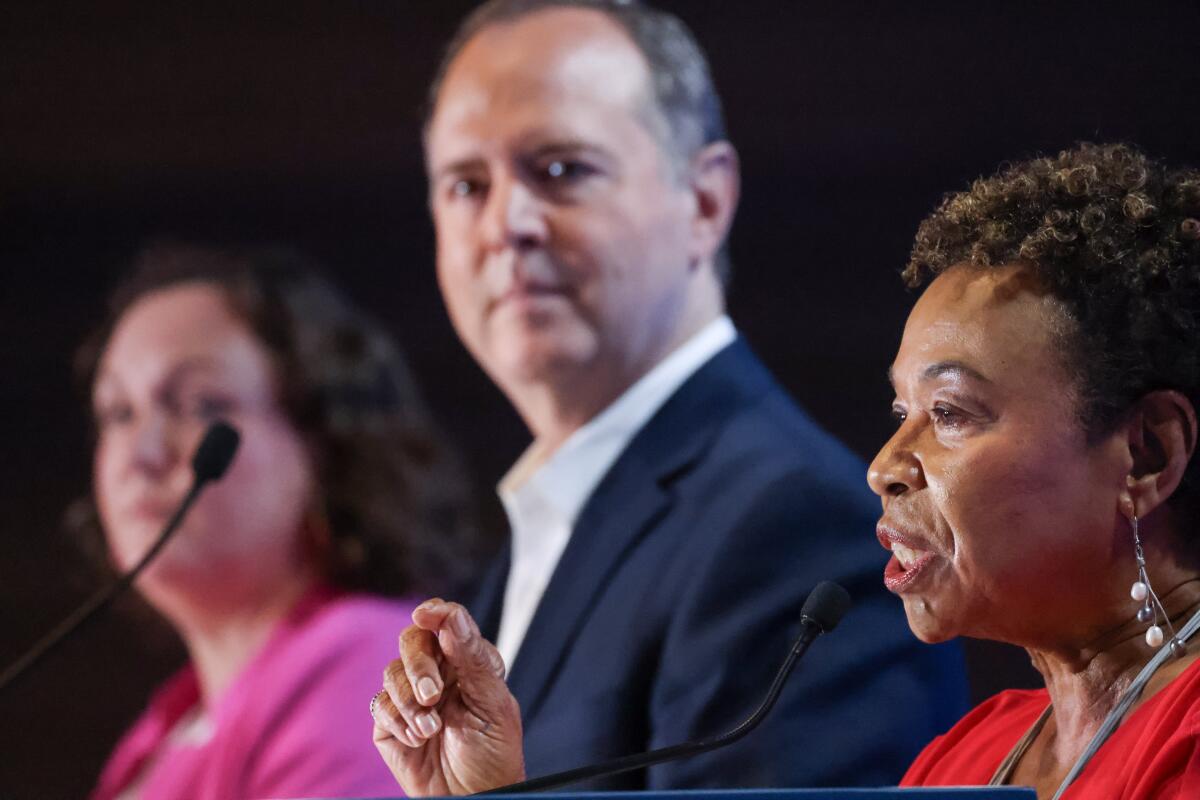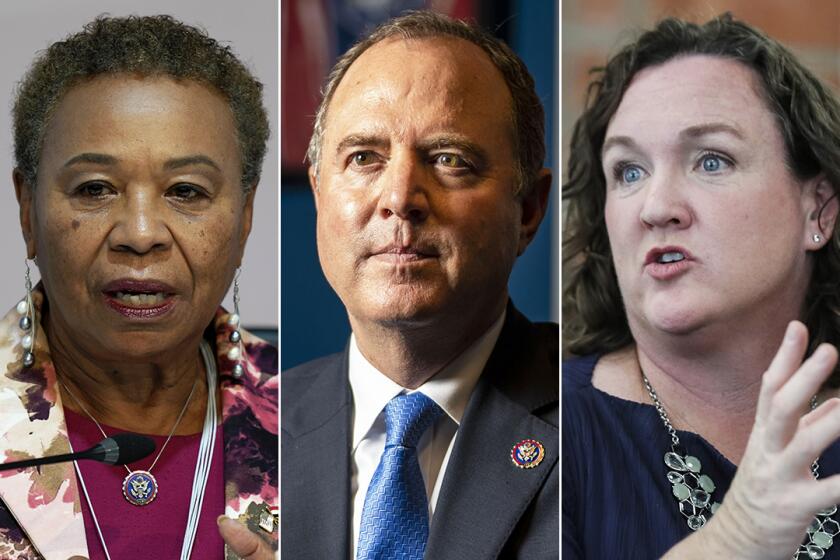Israel-Hamas war puts top Democratic Senate candidates’ foreign policy differences in the spotlight

- Share via
WASHINGTON — Just a few days after terrorists attacked America on Sept. 11, 2001, as Congress rushed to give President George W. Bush wide-ranging power to invade Afghanistan, Rep. Barbara Lee (D-Oakland) faced a decision that would come to define her career.
As she weighed her vote, Lee thought of a lesson she’d learned in an earlier job running a community mental health center: “Don’t make critical decisions when you’re grieving and mourning, angry, confused.”
Lee decided that the authorization as written “could set the stage for forever wars,” she told The Times in a recent interview. After intense deliberation, she decided to vote no — the only member of Congress to oppose the bill.
Sen. Dianne Feinstein had announced that she would not seek reelection before her death. Here are the announced and potential candidates for her seat.
Twenty-two years later, Lee, Burbank Rep. Adam B. Schiff, and Irvine Rep. Katie Porter are the top Democrats in the race for the U.S. Senate seat once held by Dianne Feinstein, for decades a key player on foreign and national security policy.
California voters now face a choice among candidates with vastly divergent approaches to — and experience with — foreign policy.
Lee’s immediate reaction to the attack on Israel by Hamas militants this month sounded much like her response to 9/11.
“Our country has a responsibility, I believe, to call for a cease-fire and to call for the whole world to come together to try to stop the escalation of what is taking place in the Middle East. And peace is possible if we can bring all parties together to talk,” she said at a candidate forum the weekend of the attack.
Schiff sounded a different note:
“The only sentiment I want to express right now when Israel is going through its own 9/11 is unequivocal support for the security and the right of Israel to defend itself,” he said.
Israel-Hamas war: In a national vigil of sorts, Israelis hope for the return of more than 220 people seized by militants and believed held in Gaza.
Lee and Schiff’s decades of work on foreign policy issues contrast with the relative inexperience of Porter, a third-term lawmaker whose House career has focused more on domestic issues.
In her answer at the forum, Porter pivoted to a hawkish line about Iran that sounded a lot like what some leading Republicans said in the immediate aftermath of the attack.
“I stand with Israel in this time and I condemn the loss of lives — both of Palestinians and Israelis who are being victims of this terror,” she said, asserting that “the United States has allowed terrorism to flourish and has refused to take a strong enough stance against Iran” — which backs the militant groups Hamas and Hezbollah.
When asked what specific Iran policy Porter was referring to, a spokesperson pointed to President Trump’s withdrawal from the treaty aimed at curtailing Iran’s nuclear program.
Lee and Schiff have long differed on foreign policy.
Besides voting against the war in Afghanistan, Lee voted against authorizing the Iraq war and the Patriot Act, which expanded government surveillance powers. Schiff voted for all three. (He has since said he regretted his Iraq vote.) Lee opposed the Obama administration’s 2011 missile strikes in Libya, while Schiff conditionally supported them.
Schiff voted to approve final passage of the last seven annual defense funding bills; Lee, who has long pushed to slash Pentagon spending, voted against every one. (Porter voted against the most recent two spending bills but voted for them the first two years she was in Congress.)
In the race to replace the late Sen. Dianne Feinstein, Rep. Adam Schiff continues to hold a strong lead over his rivals in fundraising, bringing in nearly $6 million in campaign contributions in the last three months.
Lee told The Times before the Hamas attack that Schiff was “part of the status quo thinking” in Washington on foreign policy, and argued that Porter “doesn’t have a foreign policy record to stand on because she just hasn’t been in Congress long enough.”
Schiff declined to directly contrast his record with his opponents’ in an interview shortly before the Hamas attack. But he emphasized his years as the top Democrat on the House Intelligence Committee and the opportunity that’s given him to get to know world leaders.
“I’ve been deeply engaged in both foreign policy issues, national security issues and intelligence issues,” Schiff said. “It’s given me, I think, a wealth of experience to deal with and address some of the paramount national security challenges facing the country.”
Schiff’s years leading the House Intelligence Committee helped prepare him to prosecute Trump at his first impeachment trial — where diplomats and military officials testified that the then-president had tried to pressure Ukraine into launching an investigation into Joe Biden and his son Hunter in exchange for U.S. weapons the country wanted to defend itself against Russian aggression.
“In terms of his impeachment efforts, he did a very good job,” Lee said of Schiff.
Violence surges in the West Bank as Israel increases raids to root out militants. Palestinians say the military is using the war as an excuse to crack down.
Lee got her introduction to Capitol Hill foreign policy debates in the 1980s as a senior staffer for longtime Oakland Rep. Ron Dellums, then chairman of the House Armed Services Committee. During that time, Dellums led the bipartisan charge to sanction apartheid-era South Africa.
In recent years, she’s been able to gain allies in her quest to rein in presidents’ expansive war powers — partly because elements of both parties had moved her way. Lee helped draft the Democratic National Committee’s national platform in 2016 and pushed the party’s official foreign policy stance in a much more dovish direction. Her once-lonely crusade to repeal the 2001 and 2002 authorizations of military force has gained strong bipartisan support.
Rep. Ro Khanna (D-Fremont) said Lee’s views on war and peace were a key reason for his decision to endorse her.
“I view Barbara Lee as the strongest voice against endless war, not just in the race, but in the entire Congress,” he told The Times
Schiff leads the Senate race in delegation endorsements — 22 of California’s 40 House Democrats have backed him, compared with three for Lee and none for Porter.
A number of his colleagues cited his foreign policy experience and work leading the Intelligence Committee as a major reason they’re backing him.
“That was a big part of why I chose to endorse Adam,” Rep. Ami Bera (D-Elk Grove) said. “There’s only 100 senators. So foreign policy experience is incredibly important.”
Israel and the Palestinian militant group Hamas appear set to go head-to-head on the ground in Gaza. What’s each side’s endgame?
Whoever wins the seat will be replacing a senator who played a crucial role on foreign policy, privacy and civil liberties issues for decades — at times to her fellow Democrats’ consternation.
Feinstein was the top Democrat on the powerful Senate Intelligence Committee from 2009 through 2016, and often hewed in a more interventionist direction than many in her party.
She voted to authorize the war in Iraq and was a major supporter of the Patriot Act. One of U.S. intelligence agencies’ staunchest Democratic allies for much of her career, Feinstein sided with Republicans to expand the government’s ability to covertly monitor Americans’ calls and emails without a warrant and supported giving immunity to telephone companies that had allowed the U.S. government to listen in on calls between suspected terrorists and people on American soil. When former National Security Agency contractor Edward Snowden leaked details of the government’s vast data-gathering operation, Feinstein accused him of treason. She also was a fierce defender of drone strikes and blocked President Obama from moving control of the drone strike program from the CIA to the Defense Department.
But she also was key in defending Obama’s deal to prevent Iran from attaining nuclear weapons and led the charge to investigate and declassify a report on the CIA’s secret torture program. The document may not have seen daylight if not for her work.
Schiff is probably the closest of the three candidates to Feinstein in terms of worldview and experience.
The two worked closely together as the top Democrats on the House and Senate intelligence committees. In the lead-up to the 2016 election, they pushed hard for the Obama administration to publicly call out Russia for meddling in the election. After being rebuffed, they put out a joint statement in late September 2016 declaring they’d seen evidence Russia was trying to influence the U.S. election — weeks before Obama officials finally said the same.
“Far too late,” Schiff lamented.
In recent years, the foreign policy differences between Schiff and Lee have not been as far apart as earlier in their political careers.
While Lee has fought to severely limit the CIA’s long-running drone strike program, Schiff hasn’t gone as that far — but in 2015 introduced legislation to put the program under Defense Department control. Schiff has also backed Lee’s work to repeal the 2002 law authorizing military force in Iraq. That effort has strong bipartisan support, including from Biden, and passed the House back when it was in Democratic hands in 2021 but has yet to become law.
Schiff worked across the aisle to reform the Patriot Act and end its warrantless wiretapping program. He also said the lesson he drew from his vote to back the Iraq invasion based on incorrect intelligence provided by the Bush administration led him to push to reform American intelligence-gathering services’ reports so that dissenting views are aired and “group think” is avoided.
“Seeing how an administration could mislead the country and use intelligence to do it was a very powerful motivator for me to work on reforms of the intelligence community,” he told The Times.
Both Schiff and Lee criticized the Biden administration’s handling of the chaotic withdrawal from Afghanistan, but praised the president’s decision to pull out U.S. troops.
All three leading Democratic Senate candidates generally have strongly backed U.S. military aid for Ukraine, but voted against supplying that nation with cluster munitions.
The candidates overlap on some issues regarding Israel as well.
Schiff pointed out at the forum that he has criticized Israeli settlers’ expansion into the West Bank as well as Israel’s recent “move away from democracy” — alluding to Prime Minister Benjamin Netanyahu’s attempts to undermine the independence of the judiciary.
Lee has consistently voted to provide funding for Israel’s Iron Dome missile defense system. But she was also one of 16 House Democrats to vote against a nonbinding resolution that condemned the Boycott, Divestment and Sanctions movement, which looks to block investments in Israel, and co-sponsored legislation to bar U.S. aid from going toward Israel’s annexation of West Bank land or detention of Palestinian children.
The reemergence of Israel as a global flashpoint puts their differences back on display.
Schiff continues to offer a full-throated defense of Israel.
“It is crucial that Congress works quickly to provide Israel with the security assistance, humanitarian aid and intelligence support it needs to defend itself and to safely recover the hostages taken,” he said in a statement. “Words matter and our allies around the world — as well as our adversaries — are watching us closely. It’s important, now more than ever, for the U.S. to stand united with Israel.”
Lee recently joined a letter from the Congressional Progressive Caucus to President Biden expressing deep concern about Israel’s actions in Gaza and calling for an end to the siege and a humanitarian corridor to deliver lifesaving supplies.
“Israel has the right to defend itself from Hamas, but must do so within the framework of international law,” she wrote in a statement, calling on the U.S. to “protect innocent civilians & ensure delivery of humanitarian assistance.”
Porter released a five-minute video a few days later touting her support for Israel, strongly criticizing Iran and making only brief mention of Palestinian civilians’ suffering.
“We cannot give in to Iran’s efforts to weaken our long-standing special relationship with Israel,” she said.
Porter, whose district includes a large Iranian American community, has long spoken out against the Iranian government’s brutal oppression of women and other protesters.
Porter’s campaign declined to make her available for an interview, but pointed to her work to trim defense spending and her successful push for an amendment banning senior Pentagon officials from owning stock in defense contractors as examples of her foreign policy work.
At the forum, Porter was asked a question about her lack of foreign policy experience and responded that she was a quick study.
“I have done the work and always do the work. I was a professor, so I take doing your homework pretty seriously,” she said. “I’m committed to continuing to learn.”
More to Read
Get the L.A. Times Politics newsletter
Deeply reported insights into legislation, politics and policy from Sacramento, Washington and beyond. In your inbox twice per week.
You may occasionally receive promotional content from the Los Angeles Times.
















